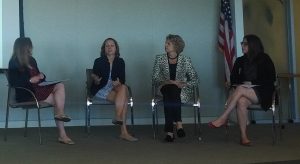
On Wednesday, August 30th, 2017, APAPASE hosted the event Principles to Which We Aspire: Social Justice and Public Health. The morning event took place in the Delaware Valley Regional Planning Commission’s main conference room. The session spoke to the link between social justice and public health through healthy community design, food access, and financial stability, while relating all topics to the AICP code of ethics. The speakers included Amanda Wagner, MCP, MGA, of Get Healthy Philly; Caroline Harries, AICP, Associate Director, The Food Trust; and Lisa Servon, Professor and Department Chair, City Planning, University of Pennsylvania.
After a brief introduction to APAPASE by Justin Dula and an introduction to the APA Code of Ethics by Kate Raman, Amanda Wagner kicked off the presentation with information about Get Healthy Philly, which is in the Chronic Disease Prevention Division of the Philadelphia Department of Public Health. They focus on healthy eating, physical activity, and smoking cessation. She discussed how chronic disease is on the rise, as well as how premature death and poverty are correlated because there is a cycle between unhealthy behavior, chronic conditions, and poverty. She also presented useful resources like the Community Health Explorer, PhillyPowered.org and the StairWELL toolkit for employers.
Caroline Harries presented information about food access and affordability. The Food Trust has a comprehensive approach to improving access to healthy food. This includes food education for children and adults; working with farmers; community outreach events like Night Market; as well as initiatives for farmers markets, supermarkets, and corner stores. She spent the bulk of her presentation talking about the Healthy Food Financing Initiative, which started in Pennsylvania as the PA Fresh Food Financing Initiative in 2004 and has since spread to multiple states and the federal government. Planners in particular should be concerned about food access because supermarkets bring jobs and foot traffic to underserved neighborhoods.
Finally, Lisa Servon spoke about the importance of challenging planners’ own assumptions when working in poorer communities. She spoke about reframing the debate about alternative financial services for the unbanked and underbanked in the United States through both her research and her experience working as a teller for a check cashing business. Policymakers assume that banks and credit unions are good and alternative financial services are bad, but alternative financial services are on the rise. Lisa’s research found that people value alternative financial services because they sometimes have lower costs than bank fees and give people greater liquidity, offer greater transparency, and offer better service. She wrote about these topics and more in her book The Unbanking of America: How the New Middle Class Survives.
If you would like to view the speakers’ PowerPoint presentations, download them here:
